Got chickens? Then you've probably wondered what exactly goes into keeping your feathered friends happy, healthy, and laying those gorgeous eggs 🐓 Don't worry – feeding chickens properly isn't as complicated as some make it out to be! Let's break down everything your flock needs in just a few minutes, so you can feel confident you're giving them the best.
Featured Product: Heygates Country Layers Pellets 20kg 🥚
Looking for an easy, reliable way to keep your hens healthy and laying? Try our trusted Heygates Country Layers Pellets 20kg! It’s a complete feed designed especially for laying hens, packed with all the vital nutrients your flock needs for strong shells, great tasting eggs, and glossy feathers.
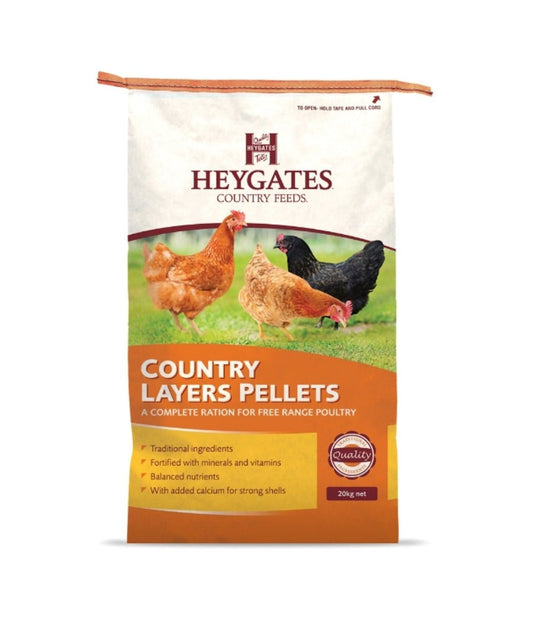
Available for click & collect in Surrey or local delivery within 15 miles of our warehouse (RH2 8QD). Just £9.99 for a 20kg bag! Give your girls—and the boys—the good stuff!
The Five Building Blocks of Chicken Nutrition 🏗️
Think of chicken nutrition like building a house – you need the right foundation and materials to create something strong and lasting. Your chickens need five essential nutrients working together:
Protein is your chickens' powerhouse nutrient. It's what helps them grow strong muscles, develop those beautiful feathers, and most importantly for your laying hens, produce quality eggs. Layer hens need about 16-18% protein in their daily feed, while growing chickens (broilers) need even more to support their rapid development.
Carbohydrates are like the fuel that keeps your chickens' engines running. Found mainly in grains like corn, wheat, and barley, these give your birds the energy they need for all their daily activities – from pecking around the yard to maintaining their body temperature during chilly mornings.
Fats might surprise you, but they're crucial too! They provide concentrated energy and help your chickens absorb important fat-soluble vitamins. Quality fat sources like sunflower seeds can actually improve your eggs by making the yolks richer and larger.
Vitamins and minerals are the supporting cast that makes everything else work properly. Calcium is especially important for laying hens – without enough, you'll get thin-shelled eggs that crack easily.
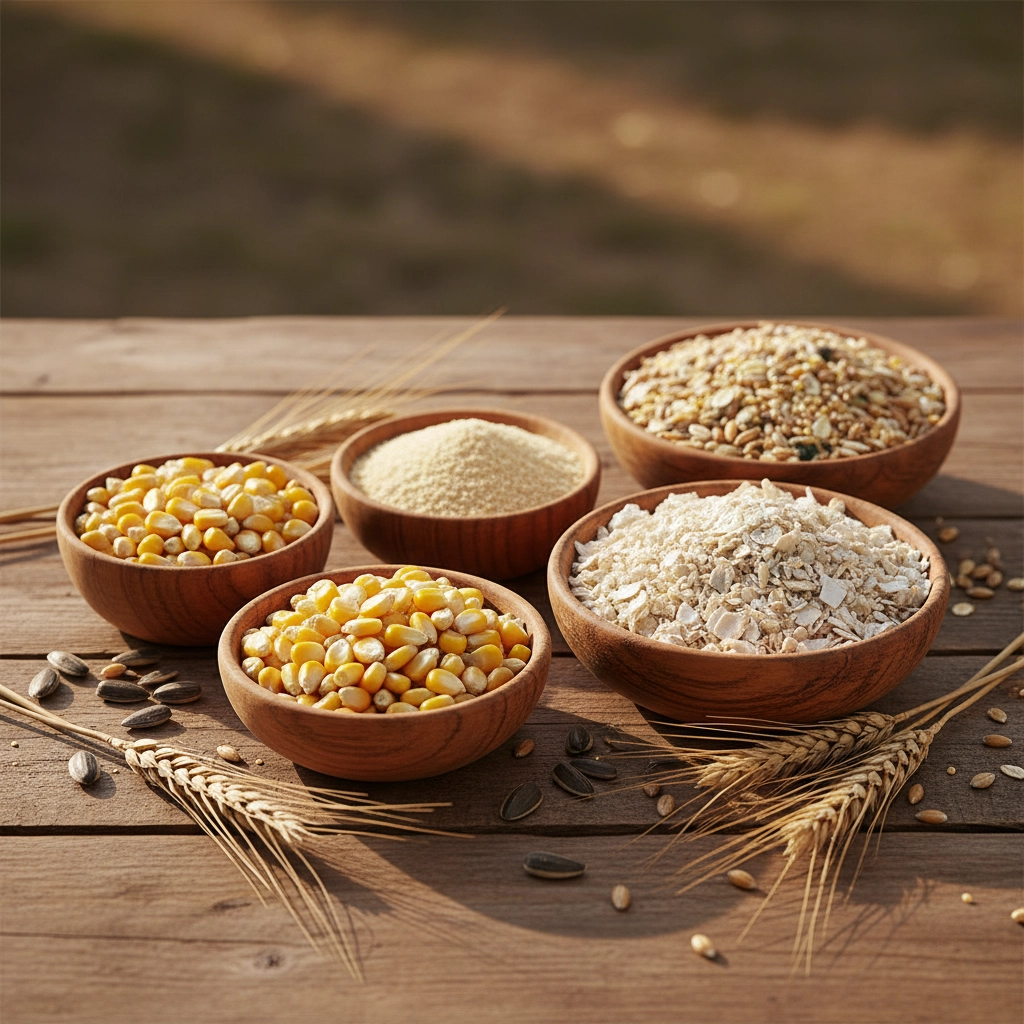
What's Actually in Quality Chicken Feed? 🌾
Ever wondered what goes into those bags of chicken feed? Here's the inside scoop on the main ingredients and why they matter:
Corn typically makes up about 50-60% of most commercial feeds. It's the main energy source and chickens absolutely love it! However, corn alone isn't enough – it's relatively low in protein, which is why it needs to be balanced with other ingredients.
Soybean meal is the protein powerhouse, usually making up about 25-26% of the feed mix. It provides high-quality plant protein and essential amino acids that your chickens' bodies can't make on their own.
You might also see fish meal and wheat in quality feeds. Fish meal adds essential fatty acids and amino acids, while wheat provides additional carbohydrates and fiber for healthy digestion.
Calcium carbonate (often from crushed oyster shells) ensures your laying hens have enough calcium for strong eggshells. Without this, you might notice your eggs becoming fragile or having thin shells.
How Much Should Your Chickens Actually Eat? 🥣
Here's something that might surprise you – each chicken eats about 100-120 grams of feed per day. That works out to roughly 20 cents per hen daily, which isn't too bad for fresh eggs every morning!
Layer hens specifically need feeds with 16-17% protein and 3-4% calcium. If you're raising chickens for meat, they'll need higher protein levels to support their faster growth.
The key is consistency. Your chickens do best when they have access to their main feed throughout the day, rather than getting fed sporadically or only receiving treats and scraps.
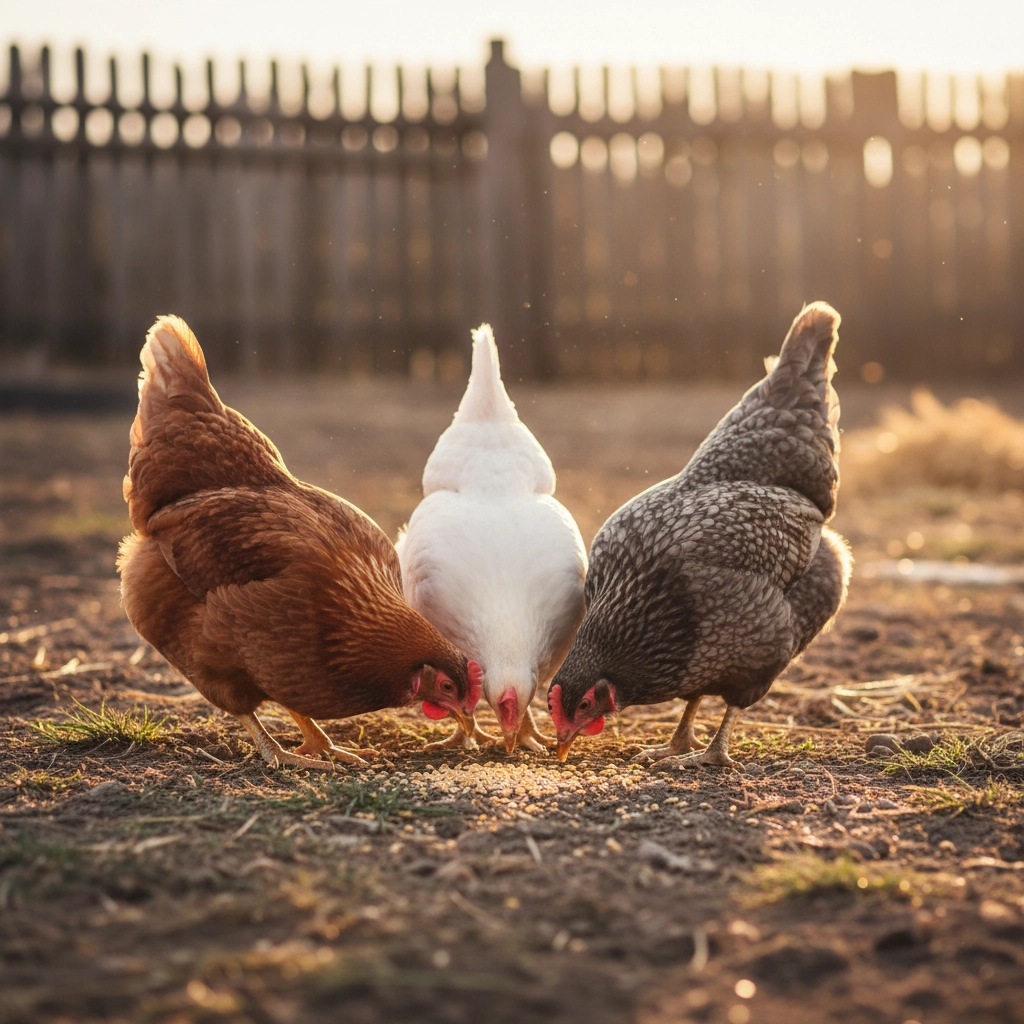
Common Feeding Mistakes (and How to Avoid Them) ⚠️
Even with the best intentions, it's easy to make feeding mistakes that can impact your flock's health and egg production. Here are the most common ones:
Over-treating your chickens is probably the biggest mistake new chicken owners make. Yes, they love kitchen scraps and treats, but these can't replace their main nutritional source. Think of treats like dessert – fine in moderation, but not as a meal replacement!
Letting chickens pick and choose from mixed grain feeds often leads to problems. Chickens will naturally pick out their favorite bits (usually the corn) and leave the rest, missing out on essential nutrients. This selective eating frequently results in decreased egg production and poor health.
Ignoring water quality is another big one. Your chickens need access to clean, fresh water just as much as they need proper feed. Dirty or stagnant water can lead to health issues quickly.
Making Smart Feed Choices for Your Flock 🤔
When you're standing in front of all those feed options, here's how to choose wisely:
Start with quality commercial feed that matches your chickens' life stage. Whether you have laying hens, growing chicks, or broilers, there's a formulated feed designed specifically for their needs. This should form the foundation of their diet.
Look for feeds with clear ingredient lists and nutritional information. Quality manufacturers will clearly state protein percentages, calcium levels, and main ingredients.
Consider your chickens' access to foraging. If your birds free-range extensively, they might need slightly different nutrition than chickens kept in runs. Free-ranging chickens can supplement their diet with insects, worms, and plants, which provides additional protein and nutrients.
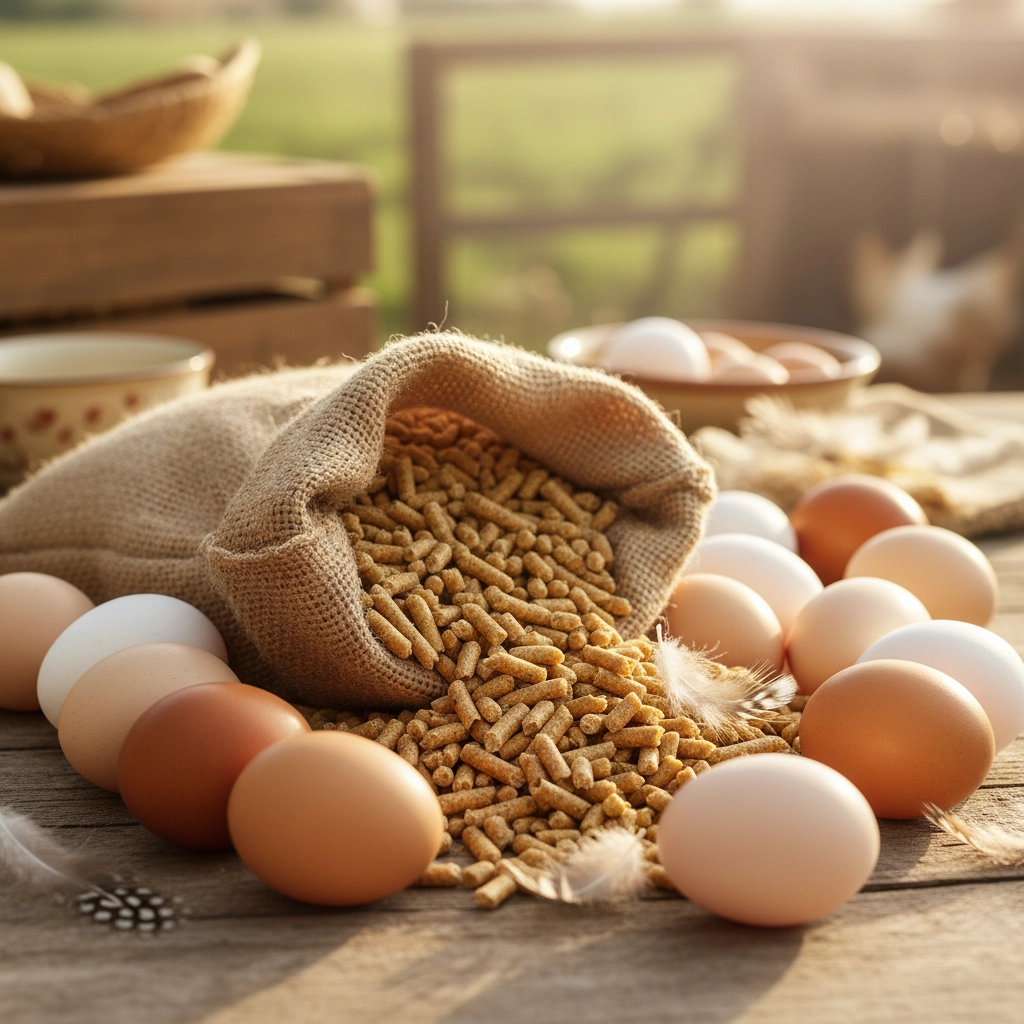
Seasonal Feeding Considerations 🍂❄️
Your chickens' nutritional needs can change with the seasons, especially during winter when they're working harder to stay warm.
Winter feeding might require slightly higher energy content to help your chickens maintain body temperature. Some chicken keepers increase the amount of corn in the diet during colder months, though the base nutritional requirements remain the same.
During molting season (usually late summer/early fall), your chickens might benefit from extra protein to support feather regrowth. This is when you might see a temporary drop in egg production as their bodies focus energy on growing new feathers.
DIY Feed: Should You Make Your Own? 🏠
Some chicken keepers love the idea of making their own feed, and it's definitely possible! A basic homemade recipe might include:
- Corn (about 58%)
- Soybean meal (26%)
- Vegetable oil (3%)
- Calcium carbonate (10%)
- Vitamin and mineral premix (3%)
However, getting the balance right is crucial. Commercial feeds are formulated by animal nutritionists who understand exactly what chickens need. If you're considering homemade feed, do your research thoroughly and consider having your mix analyzed to ensure it meets your chickens' nutritional requirements.
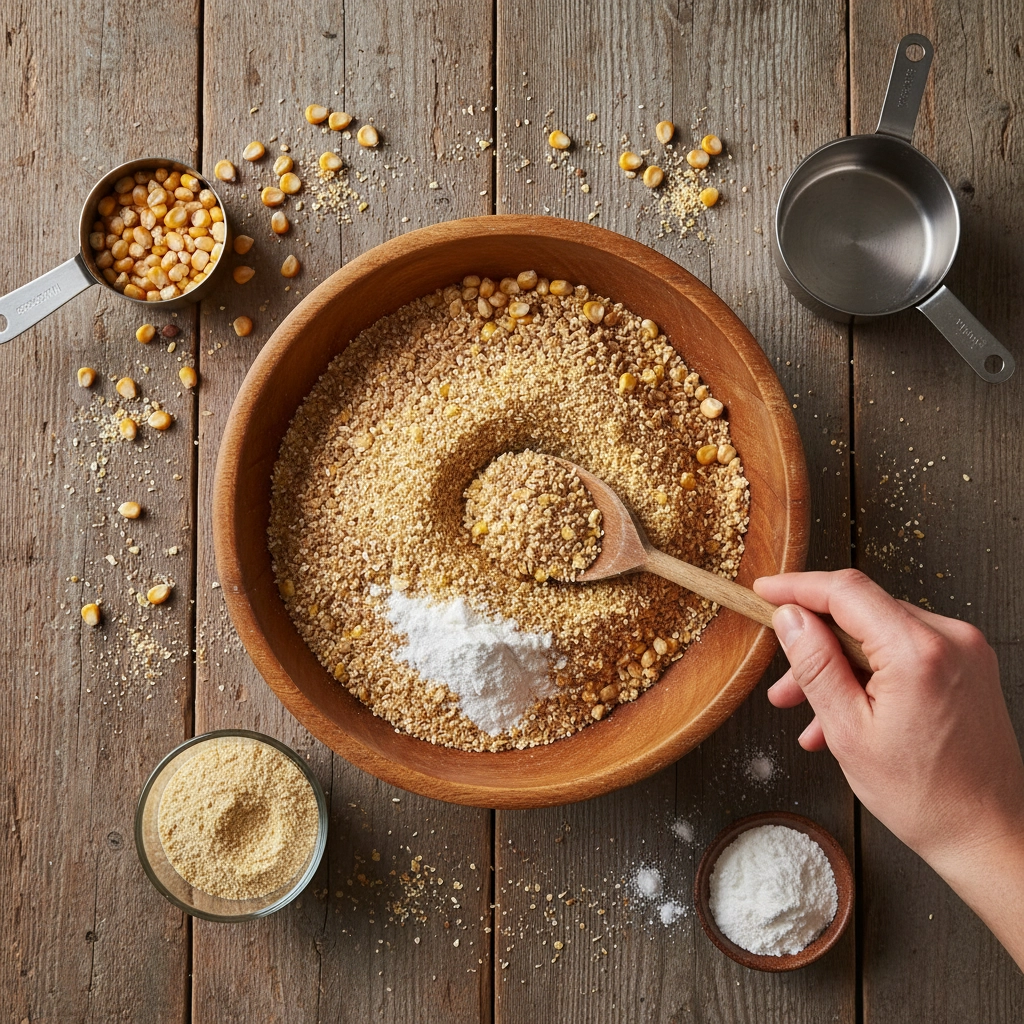
Signs Your Chickens Are Getting Good Nutrition 🌟
How do you know if you're doing it right? Healthy, well-fed chickens will show these signs:
- Bright, alert behavior and good appetite
- Glossy, well-maintained feathers without bare patches
- Consistent egg production from your laying hens
- Good body condition – not too thin or overweight
- Active foraging behavior when given the opportunity
If you notice decreased egg production, dull feathers, lethargy, or unusual behavior, it might be time to evaluate their nutrition and possibly consult with a poultry expert.
The Bottom Line: Keep It Simple, Keep It Quality 🎯
Feeding chickens well doesn't have to be complicated. Quality commercial feed should form the foundation of their diet, with treats and scraps kept to no more than 10% of their daily intake. Fresh water, consistent feeding, and observation of your flock's health and behavior will tell you if you're on the right track.
Remember, happy chickens are productive chickens! When you provide proper nutrition, you're not just keeping them healthy – you're ensuring better egg production, stronger immunity, and birds that are genuinely thriving.
Whether you're just starting with chickens or looking to improve your current feeding routine, focusing on these basics will set you and your flock up for success. Your chickens (and your breakfast table) will thank you for it! 🥚✨


